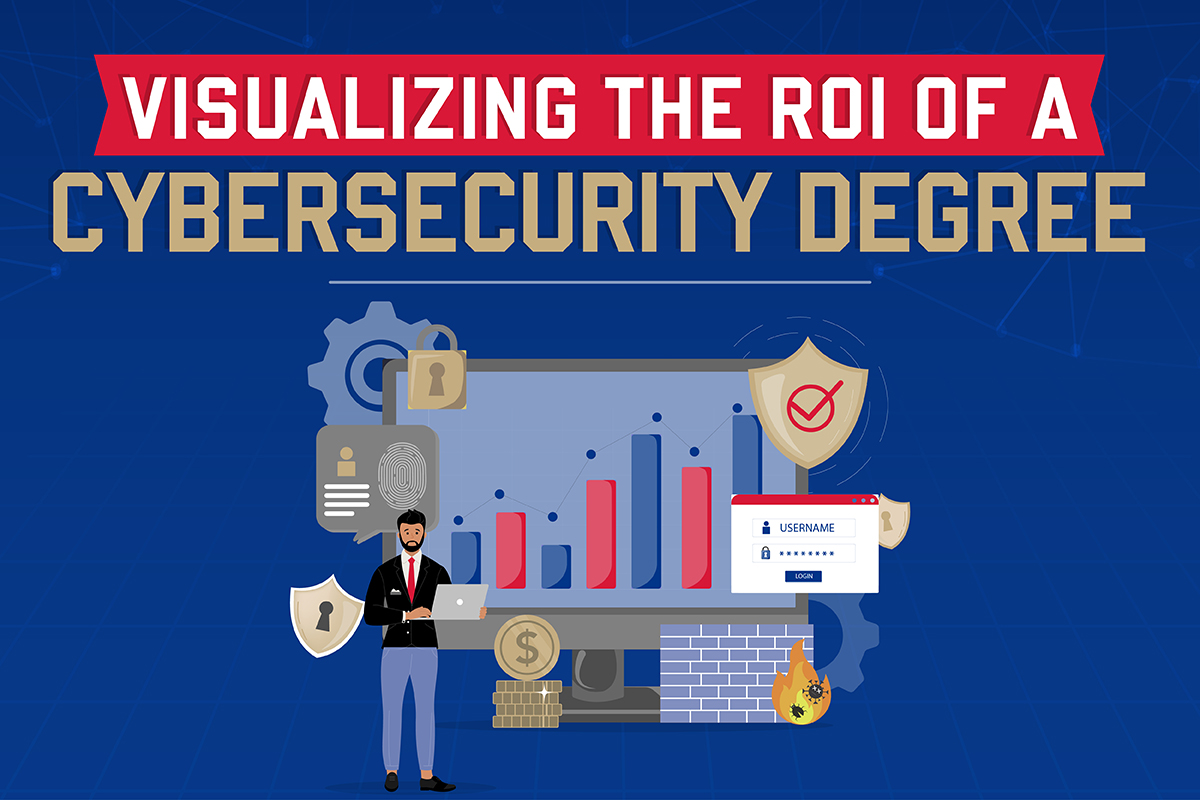What Is Cyber Fraud?
Written by:
University of Tulsa
• Jan 29, 2025

Cyber fraud is not only a technical issue but also a societal one that affects everyone, from individuals to multinational corporations.
As digital technology becomes more pervasive in our daily lives, the opportunities for cybercriminals to exploit vulnerabilities grow. In fact, according to the FBI’s Internet Crime Complaint Center, over 880,000 cybercrime complaints were made in 2023 alone; this led to potential losses exceeding $12.5 billion — a 22% increase from 2022.
With that number in mind, understanding cyber fraud is essential to protecting sensitive personal and financial information, as well as safeguarding businesses from operational disruptions and reputational damage. After all, a lack of awareness often leads to complacency, making people and organizations easy targets.
Educating yourself about what cyber fraud is and how to mitigate it is a proactive first step toward minimizing risk and creating a safer online environment.
No matter whether you’re a cybersecurity professional or simply a digital consumer, staying informed is a crucial part of combating this ever-changing threat.
Cyber Fraud Defined
According to Justin Miller, associate professor of practice of cyber studies and the director of the online Master of Science (M.S.) in Cyber Security program at The University of Tulsa, cyber fraud is a pervasive threat that “encompasses any type of deception or criminal activity carried out online in an attempt to deceive individuals or organizations and gain unauthorized access to sensitive information or assets. Its impact reverberates across society, affecting individuals, businesses, and industries alike.”
Cyber fraud is a practice that exploits vulnerabilities in technology, systems, and human behavior.
Common forms of cyber fraud include the following:
-
Phishing: The use of deceptive emails or messages to trick recipients into revealing personal information, such as passwords or credit card details
-
Identity Theft: Crimes that occur when cybercriminals steal personal data to impersonate victims and carry out fraudulent transactions
-
Ransomware: Attacks that involve malicious software that locks users out of their systems or data until a ransom is paid
Other forms of cyber fraud include online shopping scams, investment fraud, and social engineering schemes. These activities are constantly evolving, making it key to understand their mechanisms and prevent potential attacks.
Why Cyber Fraud Is a Threat
Recognizing what cyber fraud is and why it is such a crucial topic is essential due to its far-reaching consequences for individuals, businesses, and society at large.
Miller states: “For individuals, cyber fraud can lead to financial loss, identity theft, and emotional distress. Phishing scams, social engineering attacks, and ransomware can compromise personal data, drain bank accounts, and disrupt lives. The elderly and those less tech-savvy are particularly vulnerable.”
Businesses face even greater risks, including lost revenue, reputational damage, and the erosion of customer trust. According to IBM’s Cost of a Data Breach Report 2024, the average cost of a data breach has reached $4.88 million globally, significantly underscoring the several financial repercussions of cybercrime.
Careers Related to Cyber Fraud Prevention and Mitigation
The fight against cybercrime has created a growing demand for skilled professionals in cybersecurity.
These roles are central to protecting sensitive data, preventing financial losses, and ensuring the integrity of digital systems. Careers in this field offer excellent growth opportunities and the chance to work on the front line of combating cybercrime.
Here are some key career paths to consider.
Fraud Analyst
Fraud analysts investigate and monitor suspicious activities to prevent fraud. Individuals in these roles require strong analytical skills and proficiency with fraud detection tools.
Ethical Hacker
Responsible for testing systems for vulnerabilities, ethical hackers simulate cyber attacks to strengthen defenses. Certifications such as the Certified Ethical Hacker (CEH) credential are often required.
Cybersecurity Analyst
Charged with monitoring networks and responding to threats in a real-time environment, cybersecurity analysts have skills in IT systems, firewalls, and intrusion detection systems.
Compliance Officer
Tasked with ensuring an organization’s adherence to cybersecurity regulations, compliance officers are familiar with laws such as the California Consumer Privacy Act (CCPA) and the EU’s General Data Protection Regulation (GDPR). They have a keen attention to detail and deep regulatory knowledge.
As threats escalate and the answer to that question continues to change, the cybersecurity industry has many opportunities for professionals to grow, develop specialized skills, and make a tangible impact.
Industry Trends in Combating Cyber Fraud
Numerous transformative trends are shaping the landscape in the fight against cyber fraud. Miller believes that “combating cyber fraud requires a multi-layer approach.”
Artificial intelligence (AI) and machine learning are revolutionizing fraud detection by identifying patterns and anomalies faster than ever before, helping organizations respond proactively to threats.
Furthermore, enhanced regulatory frameworks continue to place data protection and accountability at the forefront, driving businesses to adopt stronger security measures and invest in employee education.
International collaboration among governments and organizations has also become a common practice as information sharing is necessary to combat cyber threats on a global level.
Finally, public awareness campaigns are also paramount as individuals and businesses must consistently improve their education about cyber fraud risks along with prevention strategies to reduce vulnerabilities at all levels.
Skills Needed to Address Cyber Fraud
When thinking about what cyber fraud is and considering the skills required to address the problem, a professional considering a career in this field should have an appropriate blend of hard and soft skills.
Cybersecurity professionals should be knowledgeable about the following:
-
Firewall systems
-
Intrusion detection systems
-
Encryption technologies
Equally vital are soft skills, such as problem-solving, critical thinking, and clear communication — all key to analyzing threats and collaborating with multidisciplinary teams.
Given the constantly evolving nature of cybercrime, ongoing learning is essential. Monitoring the latest attack methods, technologies, and regulations ensures readiness to respond to emerging challenges. Advanced degrees, such as an M.S. in Cyber Security, and certifications, such as the Certified Information Systems Security Professional (CISSP) and Certified Information Security Manager (CISM) credentials, can enhance expertise, helping professionals stay ahead in the fight against cyber fraud.
Expand Your Knowledge About Preventing Cybercrime
Cyber fraud is a growing threat that demands awareness, skills, and decisive action to combat it effectively.
By understanding and staying informed about prevention strategies, individuals and businesses alike can better protect themselves.
To gain in-depth knowledge and prepare for a career in the field, explore the comprehensive training and resources offered by the online M.S. in Cyber Security at The University of Tulsa. The program offers foundational coursework in sociotechnical system security, nontechnical considerations in cyber attacks, and fundamentals and applications related to network security design and cryptography.
Find out how TU can equip you with the tools to make a difference in the fight against cyber fraud.
Recommended Readings
Malware Analyst Career Overview
How to Become an Ethical Hacker
Cybersecurity vs. Data Analytics: Similarities and Differences
Sources:
FBI, IC3 Annual Report and Fraud Flyer
F5, 2024 State of Application Strategy Report


